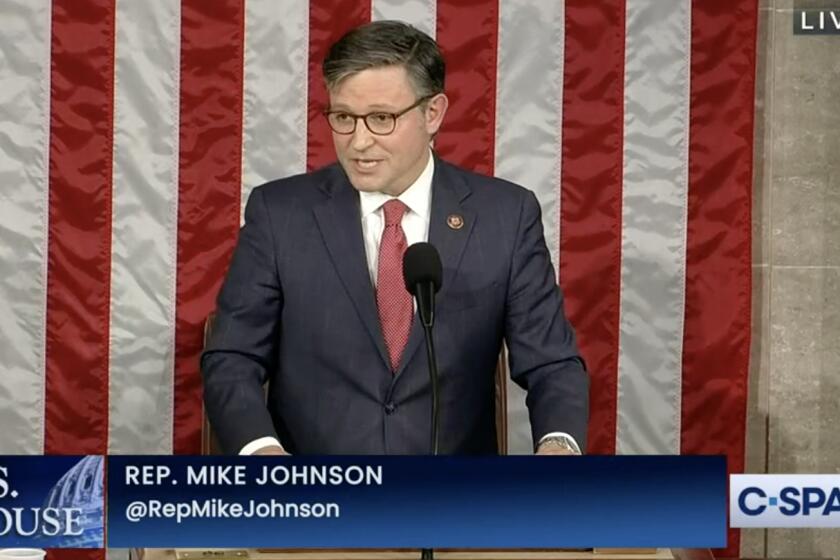Clarence Thomas and the bottomless self-pity of the upper classes

- Share via
Articles asking us to feel sympathy for families barely scraping by on healthy six-figure incomes may be staples of the financial press, but it’s rare that they come packaged as real-world case studies attached to flesh-and-blood individuals.
But that’s what happened just before Christmas, when law professor Steven Calabresi defended Supreme Court Justice Clarence Thomas’ shadowy financial relationships with a passel of conservative billionaires by explaining that Thomas simply was trying to avoid the difficulty of surviving on his government salary of $285,400 a year.
“If Congress had adjusted for inflation the salary that Supreme Court justices made in 1969 at the end of the Warren Court, Justice Thomas would be being paid $500,000 a year,” Calabresi wrote, “and he would not need to rely as much as he has on gifts from wealthy friends.”
That’s a novel definition of “neediness”: Calabresi was saying that Thomas had no choice but to create an ethical quandary for himself by accepting gifts from “friends,” some of whom have interests directly or indirectly connected with cases before the Supreme Court and on which Thomas has ruled.
If Congress had adjusted for inflation the salary that Supreme Court justices made in 1969..., Justice Thomas would be being paid $500,000 a year, and he would not need to rely as much as he has on gifts from wealthy friends.
— Steven Calabresi, Reason Magazine
Given these ethical issues, Calabresi’s argument attracted some sarcasm. University of Colorado law professor Paul Campos interpreted its gist as: “It’s just fundamentally unreasonable to expect a SCOTUS justice to scrape along on nearly $300K per year in salary, without expecting that he’ll accept a petit cadeau or thirty, from billionaires who just can’t stand the sight of so much human suffering.”
Still, it’s useful to view the argument in the context of our never-ending debate about income and wealth in America. The debate regularly generates articles purporting to explain how outwardly wealthy families can’t make ends meet on income even as high as $500,000.
Get the latest from Michael Hiltzik
Commentary on economics and more from a Pulitzer Prize winner.
You may occasionally receive promotional content from the Los Angeles Times.
There was a noticeable surge in the genre in late 2020, when then-presidential candidate Joe Biden said he would guarantee no tax increases for households collecting less than $400,000. His definition of that income as the threshold of “wealthy” elicited instant pushback from writers arguing that it was no such thing.
As I’ve pointed out before, accounts of the penuriousness of life on such an income invariably involve financial legerdemain. The expense budgets published with these articles generally place the subject households in the costliest neighborhoods in the country, such as in San Francisco or Manhattan.
They also describe as necessary or unavoidable expenses many items that most ordinary families would consider luxuries. An article tied to Biden’s $400,000 promise, for instance, showed how its hypothetical family with that much income ended the year with only $34 on hand to cover “miscellaneous” expenses.
Hiltzik: Right-wing judges are on a mission to stop the FDA from warning consumers about snake oil
Right-wing hacks on the 5th circuit federal appeals court, emboldening medical charlatans, questioned the FDA’s advice not to take ivermectin for COVID-19.
Along the way, however, the emblematic couple (two lawyers with two kids) paid $39,000 into their 401(k) retirement plans, $18,000 into 529 savings plans for college, and more than $100,000 on the mortgage and property taxes on their $2-million home. Also, food with “regular food delivery,” life insurance, weekend getaways, clothes and personal care products.
Calabresi’s hand-wringing on Thomas’ behalf also engages in sleight of hand. He doesn’t mention that Thomas’ wife, Ginni, has her own career as a lawyer and consultant, though her income is unknown. (Thomas listed her employment on his most recent financial disclosure statement, but not her salary and benefits.)
Nor does Calabresi acknowledge that much of the gifting from wealthy friends on which Thomas purportedly “needs to rely” has had nothing to do with meeting the rigors of daily life as the average person would imagine them.
As ProPublica reported, they included “at least 38 destination vacations, including a previously unreported voyage on a yacht around the Bahamas; 26 private jet flights, plus an additional eight by helicopter; a dozen VIP passes to professional and college sporting events, typically perched in the skybox; two stays at luxury resorts in Florida and Jamaica; and one standing invitation to an uber-exclusive golf club overlooking the Atlantic coast.”
To Calabresi, the questioning of this largess by the “left wing” is “sickening and unfair,” since in his view Thomas is “the best and most incorruptible Supreme Court justice in U.S. history.” Your mileage may vary; the overall tone of Calabresi’s piece is reminiscent of the line, “Raymond Shaw is the kindest, bravest, warmest, most wonderful human being I’ve ever known in my life,” uttered repeatedly in the movie “The Manchurian Candidate.”
It’s worth noting that in the movie, the line is spoken by soldiers who were brainwashed at a North Korean prison camp. Just saying.
America’s retirement system is already among the worst in the developed world. If new House Speaker Mike Johnson were to get his way, it would be far worse.
Calabresi benchmarked Thomas’ salary against those of law school deans or young lawyers with sterling credentials such as former Supreme Court clerks, which he placed at about $500,000 a year. But discussions turning on the relative pay of various jobs and professions always have an otherworldly, even absurd, feel.
In part that’s because it’s harder than you might think to compare the work of a Supreme Court justice to that of a law school dean — not to mention comparing the work of a justice to that of a merchandise picker in an Amazon warehouse.
As Campos observes, Supreme Court justices have lifetime sinecures (only one has ever been removed through impeachment), a lifetime pension at full pay after retirement, a huge professional bureaucracy to lean on, an annual three-month paid vacation and the “psychic benefit” of being endlessly praised for their perspicacity, wisdom and (to cite Calabresi) incorruptibility. Law school deans and lawyers can’t match those bennies.
For further perspective, the federal minimum wage has been frozen at $7.25 an hour since July 2009. In that time span, its purchasing power has fallen to $5.08. In the same period, the salary of Supreme Court justices has risen to $285,400 from $213,900, an increase of 33.4%.
That may not have quite kept up with inflation, which would have raised the justices’ pay to about $311,060 since 2009, but it’s not anything like the march backward experienced by those on the federal minimum wage.
Articles asking us to sympathize with high-income couples barely scraping by or even falling deeply into debt despite income in the high six-figures are staples of the financial press.
It’s true that representatives and senators also haven’t received a pay raise since 2009, but they’re not exactly living on the minimum wage: The salaries for rank-and-file legislators is $174,000 but the majority and minority leaders of both chambers and the Senate president pro tem get $193,400 and the House speaker gets $223,500.
They also pay into and receive Social Security, have a separate pension benefit and have access to government health insurance. Anyway, they collect more than twice the median household income in America, which is about $75,000.
Occasionally some journalist will make the argument that Congress should be paid more. I’ve done it twice, in 2013 and 2019, on the argument that it might attract more candidates devoted to making government work.
But those were in the halcyon days before Capitol Hill was only partly, not entirely, dysfunctional. I wouldn’t make the same argument today, when there’s reason to doubt that a higher wage would attract anyone better than the buffoons who walk the hallways of the House of Representatives at the moment.
Indeed, a higher wage might increase the psychological distance between our elected representatives and their constituents.
Just compare how eager they were in December 2017 to enact a huge tax cut for the wealthy, which passed a GOP-controlled Congress on the nod and was promptly signed by President Trump, with the dithering over the child tax credit, an immensely successful anti-poverty program that they allowed to expire at the beginning of 2022 and is just now back on the negotiating table, with no guarantee of restoration.
That tells you that the gulf between the lawmakers and the people they supposedly represent is already too wide.
As for the other argument, that paying them and the Supreme Court justices more would reduce their incentive to take bribes, just what sort of people are we electing and appointing to office?
How much more would we have to pay Clarence Thomas to get him to stop taking free yacht voyages and private flights to private clubs from rich “friends”? Sadly, to ask the question is to answer it.
More to Read
Get the latest from Michael Hiltzik
Commentary on economics and more from a Pulitzer Prize winner.
You may occasionally receive promotional content from the Los Angeles Times.














